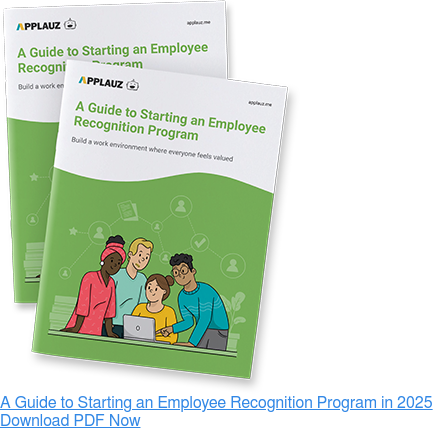Have you ever heard a friend or family member complain about the following:
- "I'm so sick of my boss, he appreciates me too much."
- "I can't stand my wife always telling me how grateful she is."
Of course not! It seems almost ridiculous to read those statements out loud. Most people chronically complain about their lives lacking appreciation and gratitude.
That's because humans desire to be seen, heard, and acknowledged. It's fundamental. And recognition is a powerful way to show our appreciation for others.
Misconceptions about recognition at work
Most people agree that recognition has value in the workplace. However, a few misconceptions persist. These misbeliefs prevent organizations from reaping the benefits of recognition.
As a case in point, there are many articles on the importance of recognition at work or how to give employee recognition. Sadly, many of these articles are full of faults. They list things like: higher productivity, employee retention, and profits as the ultimate goal of recognition.
Practices such as recognition positively impact productivity and profits, but only when employees perceive the praise as genuine and authentic.
Gratitude is not a transaction
Believing productivity and profits are the primary goal of a program minimizes the human element of recognition. In short, this approach reduces recognition to a transaction.
Psychologist Paul White expands on the idea of authentic recognition in the workplace in his popular book The Vibrant Workplace.
He explains that when employees think management uses recognition to increase productivity and profits, it produces distrust. This cynicism leads to a decay of faith in leadership. As a result, generic praise is exchanged as a performance to "go through the motions" of the program.
The True Importance of Employee Recognition

Of course, a successful recognition program will result in higher morale, productivity, and retention. But the important difference is those shouldn't be your starting goals.
If companies desire to launch a successful recognition program, they must support the true importance of recognition.
In short, make these three things the starting goals for your recognition program. When your motives are sincere, the by-product of genuine recognition will naturally be higher morale, productivity, and retention.
Make employees feel individually valued
All of us want to feel esteemed in the eyes of our managers and coworkers. Psychologist Paul White explains in his bookThe Vibrant Workplace, the true value of recognition is that appreciation for colleagues communicates respect and value for them. In other words, authentic appreciation is about truly seeing someone for the value they bring to the team, not just acknowledging their raw output. Employees don't want to be viewed as "work units" whose value is only derived from how much they produced. Instead, appreciation should be about recognizing your employees as people with unique abilities, personalities, and talents. In short, it's about making employees feel special.
Show employees their work matters
Worrying about if your job is important is the first step to feeling disconnected from work. In short, doubting if your work makes a difference gives rise to feelings of detachment. This is especially true in large organizations where employees are more prone to feeling like another cog in a wheel. The reality is, everyone's role is essential to a bigger picture. But, when bogged down in the daily grind, employees can forget where their contributions fit in. Recognition is important because it helps employees zoom out -- reminding them why their work matters and how they make a difference in the bigger picture. Ultimately, making them feel more connected and satisfied with their work.
Cultivate a positive environment of trust & respect
When you can trust your coworkers and know that they have your back, it's wonderful. On the other hand, feeling like your team is always in competition or secretly rooting against each other is toxic. This cold environment leaves employees feeling miserable. And worse, burnt out. Employee recognition (especially peer-to-peer recognition) serves to bring people together with trust and respect. As a result, the opposite type of environment is created, one that is warm, friendly, and collaborative.

Increased morale
When leaders understand the true purpose of recognition, it improves employee morale on an individual level. Employees leave work feeling deeply valued. In essence, workers feel an increased sense of well-being and job satisfaction. In turn, group morale increases and a spirit of respect and positivity begins to permeate the workplace. Which naturally leads to our next points.
Higher productivity
Authentic recognition boosts employee engagement. In turn, employees are more productive. It seems simple on paper, but the focus must be on giving genuine recognition. Simply put, words of recognition that are perceived as fake or generic do not count. But when done correctly, recognition boasts great benefits for business. Psychological studies have shown that a simple expression of thanks by someone in authority led people to be 50% more productive!
Higher employee retention
The ultimate test for the success of a recognition program is employee retention rate. Simply put, are our employees staying longer? Employees who feel valued at work will naturally be more inclined to stay with your company. On the other hand, employees who feel undervalued--as if their work doesn’t matter--will be more likely to see your company as a placeholder until their “dream” company. Building a thoughtful employee recognition program will help your organization get one step closer to being a “dream company” for top talent in the job market.
Final Thoughts
To understand the true purpose of recognition it helps to think about how it feels to receive word of flattery that is being used to "butter you up." At best, it feels good but insincere. And at worse, it feels suspicious and manipulative.
As such, to produce the bottom-line benefits like increased engagement and productivity, leaders must shift their way of thinking.
In essence, the right philosophy to build a successful program is not "I praise my employees so that they work harder for me." But instead, "I praise my employees because I want everyone to remember they are valuable to our business."



